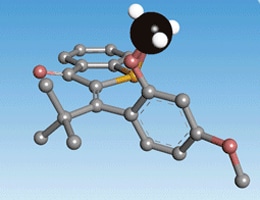Nov 23 2018
The first, new molecular motor has been developed by LMU chemists that can be simply powered by light alone, which means its operation does not actually depend on the temperature.
 The new molecular motor requires only three light-driven reaction steps to achieve complete rotation. (Image credit: A. Gerwien, LMU)
The new molecular motor requires only three light-driven reaction steps to achieve complete rotation. (Image credit: A. Gerwien, LMU)
In response to an external energy input, molecular motors typically rotate unidirectionally and they represent a major class of components for forthcoming applications in the nanotechnology field. Molecules whose spatial and structural conformation can be modified by light have been shown to be potential candidates for this kind of task. But, so far, all light-driven molecular motors that have been described tend to rely on reactions that need heat input and thus depend on a certain minimum environmental temperature.
Now, LMU chemist Henry Dube has made a decisive breakthrough in this regard. Dube, along with his student Aaron Gerwien, developed the first-ever molecular motor that rotates when exposed to light, regardless of the temperature. Moreover, its operation is not conditional on a certain minimum temperature, and in fact, rotates more rapidly at lower temperatures. This special property of the novel molecular motor could considerably expand the range of uses available to upcoming nanomachines. The results of the study have been recently published in the Journal of the American Chemical Society.
One important property that converts an artificial chemical into a molecular rotary motor is that some component of the molecule can be rotated unidirectionally by an external energy source, and each 360° rotation occurs in separate steps similar to the ticking of the hand of a clock. Here, the difficult part is to make sure that each forward step does not go into a reverse direction. To date, all the molecular motors that have been described have utilized the so-called ratchet mechanism to avoid such reversals. The concept is that following each forward step, a ratcheting step modifies the molecular configuration in such a way that the reverse reaction is sterically prevented. The conformational modifications required to realize this are usually induced by heat. Consequently, the speed of rotation depends on the ambient temperature, and the movement stops below a specific minimum temperature.
Similar to previous motor systems designed by Dube and his colleagues, the novel motor is based on hemithioindigo—an organic substance. In this molecule, two different carbon skeletons are present which are joined by a mobile double bond.
We have succeeded in modifying the molecule such that a complete rotation of one of the structural modules relative to the other requires only three reaction steps.
Henry Dube, Chemist, LMU
It is the visible light that activates each rotational step, and intermediate, thermally-driven ratchet steps are no longer required. Obviously, all three steps involved in the entire rotation are caused by reduced temperature, so that the rate of rotation of the novel molecules really increases at lower temperatures.
Each rotation step is made up of three different photoreactions, two of which we experimentally demonstrated directly for the first time only this year.
Henry Dube, Chemist, LMU
The investigators are confident that the unique behavior and novel driving mechanism of their motor will allow researchers to create molecular machines in the near future. Such molecular machines, due to their relative insensitivity to the accurate environmental temperature, will lead to exceptional applications that are otherwise not possible with motors known so far.